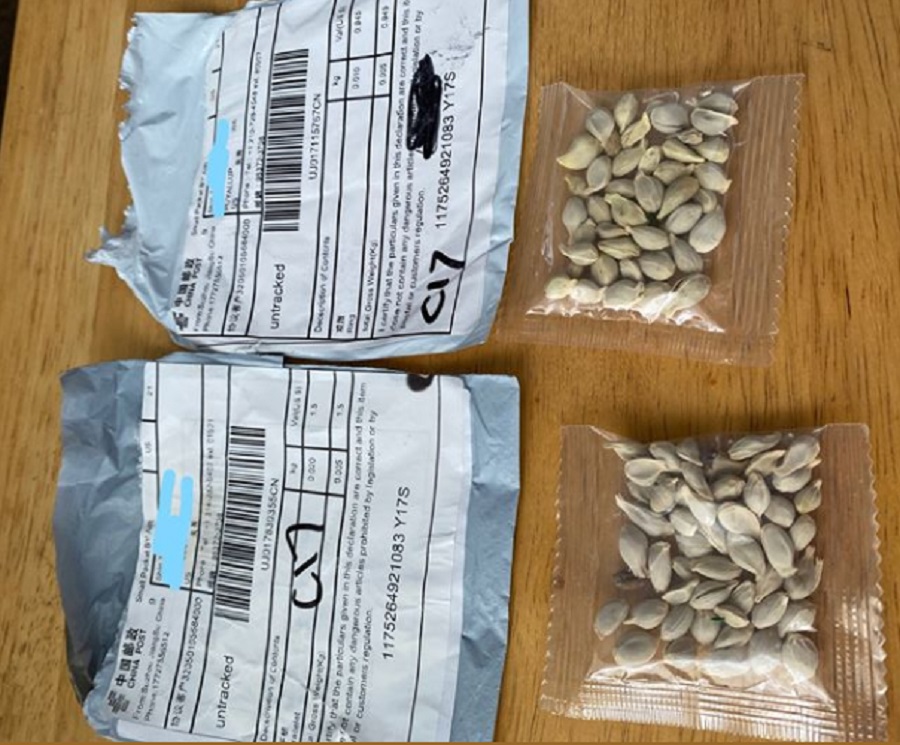
In July 2020, social media users began circulating a warning from the Washington State Department of Agriculture about people in the US receiving unsolicited shipments of seeds shipped from China (sometimes in packages that identify the content as jewelry), which included a warning that recipients not plant the received seeds and report them to the United States Department of Agriculture (USDA) as cases of agricultural smuggling:
Today we receive reports of people who received seeds by mail from China that they did not order. The seeds are shipped in packages that generally indicate that the contents are jewelry. Unsolicited seeds can be invasive, introduce disease to local plants, or be harmful to livestock.
Here’s what to do if you receive unsolicited seeds from another country:
1) DO NOT plant them and if they are in a sealed package do not open the sealed package.
2) This is known as agricultural contraband. Inform USDA and keep seeds and packaging until USDA tells you what to do with the packages and seeds. They may be necessary as evidence.
This warning corresponded to several other government alerts and news accounts about people in the UK and various US states that received such unsolicited emails. The Virginia Department of Agriculture and Consumer Services (VDACS), for example, issued a similar warning to residents of that state:
The Virginia Department of Agriculture and Consumer Services (VDACS) has been notified that several Virginia residents have received unsolicited packages containing seeds that appear to have originated in China. The types of seeds in the packages are unknown at this time and may be invasive plant species. Packages were mailed and may be written in Chinese.
Please do not plant these seeds. VDACS encourages anyone who has received unsolicited seeds in mail that appears to be of Chinese origin to contact the Office of Plant Industry Services (OPIS) at 804.786.3515 or email [email protected].
Invasive species wreak havoc on the environment, displace or destroy native plants and insects, and severely damage crops. Taking steps to prevent their introduction is the most effective method of reducing both the risk of invasive species infestations and the cost of controlling and mitigating such infestations.
Newsweek also reported on Utah residents receiving the same type of unsolicited packages:
Several Utah residents have been surprised with a quirky package in their mailboxes: a package full of seeds and Chinese writing on the outside.
“I opened them up and they were seeds,” said Utah resident Lori Culley, who found her package in Chinese characters, along with a label indicating there were earrings inside. “Obviously they are not jewelry!” she said.
Culley, who lives in Tooele, thought it might be the wrong address, but when he posted about it on social media, he found that “at least 40” local residents had received similar packages in the past few weeks.
There are regulations on what plants and seeds can be imported and sold in Utah. Since delivery, a representative from the Utah Department of Agriculture collected Culley’s seeds for analysis. The department may also obtain assistance from Customs and Border Protection agents to investigate the mysterious seeds.
Less secure is the purpose behind emails. Explanations of drug smuggling to attempts to trick Americans into planting harmful invasive species have been discussed, although a somewhat different reason has also been suggested: “Jane Rupp of the Better Business Bureau has another theory. She thinks it might be just a customer review scam, in which companies post low-cost articles so they can write fake reviews for their business on behalf of a resident. “
As US News & World Report explained, the “fake listing scam” is employed by ill-reputed sellers on sites like Amazon.com, as they try to build fake reputations as trusted sellers to make it easier to lure victims into their scams:
[T]Here there have been some cases of criminals who buy their own products and send them to a real address. The scammer then writes a bogus review, allegedly of the buyer the product was shipped to. Why does the thief get into trouble? To make it look like a “verified” review, as the review came from a “buyer” who purchased the product.
“Amazon is continually developing algorithms to automatically detect these merchants, but it also depends on consumer awareness.” [Kevin Lancaster, CEO of ID Agent] He says. And what can really discourage people is that these scammers sometimes rack up a couple of months of legitimate sales, making a scammer’s products look reputable, Lancaster says. “People buy from fake listings, and instead of receiving a product in a few weeks, the scammer has already taken the money,” he explains.
Right now, it seems true that the mysterious seed shipments sent with return addresses in China are real, but the specific reason behind them is still unknown.